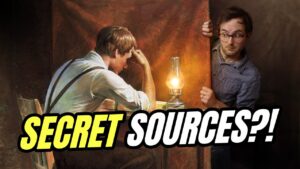Reviews
User Score
Rate This
Descriptions:
Throughout Christ’s life, he made a lot of enemies. Pharisees, Sadducees, scribes, elders, the Sanhedrin, etc. In this episode, Dave takes a closer look at who these people are, what they believe, why they’re important, and how they are all connected.
“Sanhedrin” via Encyclopedia Britannica: https://bit.ly/2YU8EZe
“Sanhedrin” via the Bible Dictionary: https://bit.ly/3j2QEmv
“The Sanhedrin: The Jewish Court System” via Chabad.org: https://bit.ly/3CNuz31
“Sadducee” via Encyclopedia Britannica: https://bit.ly/3AZHUnu
Some relevant commentary from BibleHub: https://bit.ly/3lGPw9R
“Zealot” via Encyclopedia Britannica: https://bit.ly/3BDLXXz
“Pharisee” via Encyclopedia Britannica: https://bit.ly/3k6ucJF
“Pharisees” in the Guide to the Scriptures: https://bit.ly/3GLjwtD
Josephus talks about the Pharisees, Sadducees, Zealots, and a fourth group not mentioned in the New Testament called the Essenes, in 18.1.2-6 of “Antiquities of the Jews”.
Notes:
— “The historical background behind the statement We cannot legally put anyone to death [John 18:31] is difficult to reconstruct. Scholars are divided over whether this statement in the Fourth Gospel accurately reflects the judicial situation between the Jewish authorities and the Romans in 1st century Palestine. It appears that the Roman governor may have given the Jews the power of capital punishment for specific offenses, some of them religious (the death penalty for Gentiles caught trespassing in the inner courts of the temple, for example). It is also pointed out that the Jewish authorities did carry out a number of executions, some of them specifically pertaining to Christians (Stephen, according to Acts 7:58-60; and James the Just, who was stoned in the 60s according to Josephus, Ant. 20.9.1 [20.200]). But Stephen’s death may be explained as a result of “mob violence” rather than a formal execution, and as Josephus in the above account goes on to point out, James was executed in the period between two Roman governors, and the high priest at the time was subsequently punished for the action. Two studies by A. N. Sherwin-White (Roman Society and Roman Law in the New Testament, 1-47; and “The Trial of Christ,” Historicity and Chronology in the New Testament [SPCKTC], 97-116) have tended to support the accuracy of John’s account. He concluded that the Romans kept very close control of the death penalty for fear that in the hands of rebellious locals such power could be used to eliminate factions favorable or useful to Rome. A province as troublesome as Judea would not have been likely to be made an exception to this.” Source: https://netbible.org/bible/John+18
— My editor had some valuable tidbits to add to this topic:
“Sadducees were also very open to gentile culture. Remember that although the Romans were administrators over the Holy Land, the culture was mostly Greek. A home in Jerusalem owned by a Sadducee could have a totally Greek decor.”
“Scribes were able to speak Hebrew, the language of the scriptures, while ordinary Jews were speaking Aramaic, which they adopted in Babylon and which the Assyrians also spoke. That made them useful for a lot of tasks.”
“By the time of Christ, the office of high priest was being purchased from the Greco/Syrians and then from the Romans. Truly corrupt.”
SUBSCRIBE:
http://saintsunscripted/subscribe
Follow Us:
Facebook: https://www.facebook.com/SaintsUnscripted/
Instagram: https://www.instagram.com/saintsunscripted/
Website: https://saintsunscripted.com/
Follow the Hosts:
Justin: https://www.instagram.com/motioncoaster/
David: https://www.instagram.com/davidesnell/
Taylor: https://www.instagram.com/tsyorg/
Allex: https://www.instagram.com/allex_lennon/
Kaitlyn: https://www.instagram.com/kait_fotheringham/










